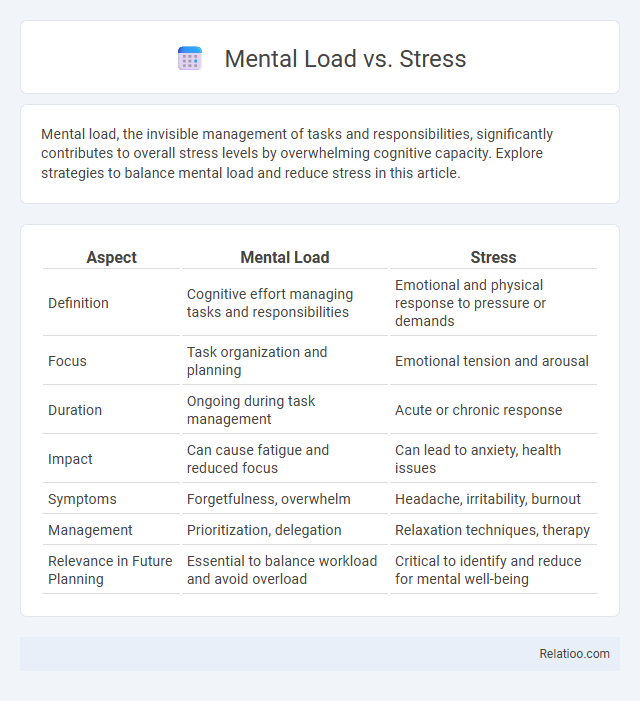Mental load, the invisible management of tasks and responsibilities, significantly contributes to overall stress levels by overwhelming cognitive capacity. Explore strategies to balance mental load and reduce stress in this article.
Table of Comparison
| Aspect | Mental Load | Stress |
|---|---|---|
| Definition | Cognitive effort managing tasks and responsibilities | Emotional and physical response to pressure or demands |
| Focus | Task organization and planning | Emotional tension and arousal |
| Duration | Ongoing during task management | Acute or chronic response |
| Impact | Can cause fatigue and reduced focus | Can lead to anxiety, health issues |
| Symptoms | Forgetfulness, overwhelm | Headache, irritability, burnout |
| Management | Prioritization, delegation | Relaxation techniques, therapy |
| Relevance in Future Planning | Essential to balance workload and avoid overload | Critical to identify and reduce for mental well-being |
Understanding Mental Load: Definition and Examples
Mental load refers to the cognitive effort involved in managing daily tasks, such as planning schedules, remembering appointments, and organizing household responsibilities. Unlike stress, which is the emotional response to challenges, mental load is the continuous background processing that requires active mental resources. Understanding your mental load helps identify invisible burdens and develop strategies to balance responsibilities more effectively.
What is Stress? Key Differences from Mental Load
Stress is a physiological and psychological response to external pressures or challenges, triggering the body's fight-or-flight reaction and impacting overall health. Unlike mental load, which refers to the cognitive effort of managing tasks and responsibilities, stress involves emotional and physical strain that can lead to anxiety, fatigue, and decreased well-being. Key differences include stress being an immediate response to threats, while mental load accumulates over time as a continuous mental burden.
The Psychological Impact of Mental Load
Mental load refers to the constant cognitive effort involved in managing daily tasks and responsibilities, often leading to significant psychological strain distinct from stress, which is typically a response to external pressure. The psychological impact of mental load manifests as mental fatigue, anxiety, and reduced emotional resilience, affecting Your overall well-being and productivity. Understanding the differences enables targeted strategies to alleviate mental load and improve mental health.
Physical Effects: How Stress Manifests in the Body
Stress triggers a cascade of physical responses in the body, including increased heart rate, muscle tension, and elevated cortisol levels, which can lead to fatigue and weakened immunity. Mental load, often stemming from continuous cognitive demands and multitasking, exacerbates stress by overwhelming your brain's capacity to manage tasks efficiently. Recognizing these physical manifestations is crucial to addressing both mental load and stress for better health and well-being.
Overlapping Symptoms: Mental Load vs Stress
Mental load and stress share overlapping symptoms such as fatigue, irritability, and difficulty concentrating, reflecting the cognitive and emotional strain experienced in daily life. While mental load primarily involves the continuous management of tasks and responsibilities, stress results from perceiving these demands as overwhelming or threatening. Both conditions impact mental well-being, highlighting the need for effective coping strategies to alleviate their burden.
Causes and Triggers: Mental Load vs Stress
Mental load originates from the continuous cognitive effort required to manage tasks, responsibilities, and plans, often triggered by household management or multitasking demands. Stress arises from external pressures or perceived threats, such as work deadlines, financial worries, or interpersonal conflicts, activating the body's fight-or-flight response. While mental load stems from ongoing mental organization and anticipation, stress is a physiological and emotional reaction to specific stressors, making their causes and triggers distinct yet often interrelated.
Gender Differences in Mental Load and Stress
Gender differences significantly influence experiences of mental load and stress, with women often shouldering a higher mental load due to societal expectations around caregiving and household management. Research indicates that women report greater stress levels linked to multitasking and balancing professional and domestic responsibilities, intensifying cognitive and emotional strain. Understanding these disparities is critical for designing effective mental health interventions and promoting gender equity in workload distribution.
Strategies to Manage Mental Load
Effective strategies to manage mental load include prioritizing tasks, delegating responsibilities, and setting clear boundaries to prevent overwhelm. Implementing mindfulness techniques and regular breaks enhances cognitive clarity, reducing the risk of stress-induced burnout. Utilizing digital tools for organization and time management supports sustained mental well-being and productivity.
Effective Techniques to Reduce Stress
Effective techniques to reduce stress caused by mental load include mindfulness meditation, which helps enhance focus and emotional regulation, and time management strategies like task prioritization to avoid overload. Physical activities such as yoga and aerobic exercise improve mental resilience and decrease cortisol levels associated with stress. Establishing clear boundaries between work and personal life, along with regular breaks, supports cognitive recovery and prevents burnout linked to excessive mental demands.
Achieving Balance: Preventing Burnout from Mental Load and Stress
Mental load and stress both contribute to burnout, but mental load specifically refers to the cognitive effort of managing tasks and responsibilities, while stress is the emotional and physical response to pressure. Achieving balance requires prioritizing self-care, setting boundaries, and delegating tasks to reduce mental load and mitigate chronic stress. Your ability to recognize early signs of overload and implement coping strategies is essential to prevent burnout and maintain overall well-being.

Infographic: Mental Load vs Stress
 relatioo.com
relatioo.com